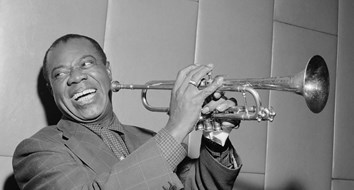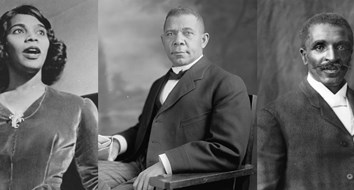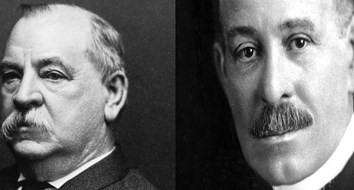“There is not an idea that cannot be expressed in 200 words. But the writer must know precisely what he wants to say. If you have nothing to say and want badly to say it, then all the words in all the dictionaries will not suffice.”
The quote you just read, written by Eric Hoffer in 1977, is a perfect example of both clarity and economy. It makes an unambiguous point with all the verbiage necessary to make it, and not a syllable more. It’s vintage Eric Hoffer, who expressed a new idea (or burnished an old one) about every 200 words or so. For decades, he’s been my personal favorite among philosophers.
So, you might ask, where did he get his PhD? At which university was he granted academic tenure? Philosophers, after all, are about as ivory tower as it gets, right?
No “earned” PhD ever adorned his name. In fact, he spent almost no time in formal schooling—at any level. Two universities bestowed honorary doctorates upon him but he was not of academia. If anything, he transcended it as a 20th Century genius in the body of a common laborer. He was, to borrow from the title of Tom Shactman’s biography of him, an “American Iconoclast.”
It’s likely, moreover, that Hoffer would have spurned anything that smacked of tenure just as he disdained the officious snobbery of many academic scribblers. He didn’t need a protected perch from which to pontificate; just a simple chair on a dock would do, or even a spot on the ground under the shade of a tree. In the best of several biographies of him, Tom Bethell (Eric Hoffer: The Longshoreman Philosopher ) writes,
"Hoffer was above all an original thinker and an outstanding writer. It is a precious combination. He subscribed to many journals and he followed current events. But he never followed any intellectual fashion.
He was free of the practical pressures that steer so many people of an intellectual disposition into conventional channels of thought. He lay beyond the peer pressure, grant-hunting, and cultural intimidation that stultify much of the academic world today."
It’s not my purpose in this two-part article to offer you a mini-biography of Hoffer. Rather, I plan to share enough of his wisdom in his own words to prompt you to want to read one or more of his ten books. They’re all winners, and not the least bit tedious or verbose. First, a little background on the man might help you appreciate him all the more.
The son of poor German immigrants, Eric Hoffer was born in the Bronx in 1898. At about age 7, he and his mother fell down a flight of stairs—an accident which led to her death a year later. Another consequence of the fall was that Eric lost his sight in both eyes. With remarkable suddenness, his vision returned when he was 15. Those eight sightless years kept him out of school but he more than made up for it as a voracious reader later. By age 20, he left New York for California an intensely self-educated young man. In those four years, he devoured more books than many people will read in a lifetime. It wasn’t the ivory tower that beckoned him west, however; he preferred to work with his hands alongside others who did the same.
On the face of it, it seems ironic that a supremely intellectual man, Eric Hoffer, would also make this statement: “Scratch an intellectual, and you find a would-be aristocrat who loathes the sight, the sound and the smell of common folk.” It’s fully understandable when you realize that the intellectuals he was referring to were the practitioners of the prevailing orthodoxy of both his day and ours, namely, the “progressive” elites who fancy themselves as the potter and the rest of us as their clay.
Hoffer spent ten years on Skid Row in Los Angeles, working at odd jobs by day and reading in public libraries by night. From there he moved on to labor for eight years as a field worker and door-to-door orange salesman in California’s Central Valley. Then not long after Pearl Harbor, he settled in San Francisco, where he embraced the profession he is most remembered for today, that of longshoreman. It was during his years working the docks that Hoffer’s prodigious reading, exceptional powers of observation and work-a-day experience combined to produce an impressive outpouring of philosophical and social commentary, the most famous of which was his 1951 book on the psychological nature and origins of fanaticism. It was titled The True Believer.
Hoffer was fascinated by the fanatic—the sort of person who often abandons reason for a cause—and he sought to explain where that mentality comes from. A few years before, the world endured a Holocaust at the hands of fanatical Nazis. Communism, a religion of fanatics, was on the march around the world. In Argentina, as I recently noted in “Still Crying for Argentina”, the egomaniac Eva Perón had just declared, “Without fanaticism, we cannot accomplish anything.” These malcontented zealots (or “true believers” as Hoffer described them), and the mass movements they spawned, cried out for an examination.
To the hardscrabble longshoreman, the phenomenon of fanaticism was rooted in a crisis of confidence in one’s self, a kind of “self-renunciation.” The “true believer” believes that sinister forces, not any shortcomings of his own, are the cause of his victimhood—the remedy for which is to replace his helpless individuality with the power of a collective juggernaut (especially if he can lead the parade himself). There being no shortage of fanaticism in the news today, it should go without saying that Hoffer’s observations are as relevant as ever. Now, let’s read a sample of them in Hoffer’s own words, excerpted from The True Believer:
"A man is likely to mind his own business when it is worth minding. When it is not, he takes his mind off his own meaningless affairs by minding other people’s business."
"Unless a man has talents to make something of himself, freedom is an irksome burden. Of what avail is freedom to choose if the self be ineffectual? We join a mass movement to escape individual responsibility, or, in the words of the ardent young Nazi, ‘to be free from freedom.' It was not sheer hypocrisy when the rank-and-file Nazis declared themselves not guilty of all the enormities they had committed. They considered themselves cheated and maligned when made to shoulder responsibility for obeying orders. Had they not joined the Nazi movement in order to be free from responsibility?"
"Those who see their lives as spoiled and wasted crave equality and fraternity more than they do freedom. If they clamor for freedom, it is but freedom to establish equality and uniformity. The passion for equality is partly a passion for anonymity: to be one thread of the many which make up a tunic; one thread not distinguishable from the others. No one can then point us out, measure us against others and expose our inferiority."
"Passionate hatred can give meaning and purpose to an empty life. Thus people haunted by the purposelessness of their lives try to find a new content not only by dedicating themselves to a holy cause but also by nursing a fanatical grievance. A mass movement offers them unlimited opportunities for both."
"People whose lives are barren and insecure seem to show a greater willingness to obey than people who are self-sufficient and self-confident. To the frustrated, freedom from responsibility is more attractive than freedom from restraint. They are eager to barter their independence for relief of the burdens of willing, deciding and being responsible for inevitable failure. They willingly abdicate the directing of their lives to those who want to plan, command and shoulder all responsibility."
"Collective unity is not the result of the brotherly love of the faithful for each other. The loyalty of the true believer is to the whole—the church, party, nation—and not to his fellow true believer. True loyalty between individuals is possible only in a loose and relatively free society."
"Hatred is the most accessible and comprehensive of all the unifying agents. Mass movements can rise and spread without belief in a god, but never without a belief in a devil."
"The quality of ideas seems to play a minor role in mass movement leadership. What counts is the arrogant gesture, the complete disregard of the opinion of others, the singlehanded defiance of the world."
"The burning conviction that we have a holy duty toward others is often a way of attaching our drowning selves to a passing raft. What looks like giving a hand is often a holding on for dear life. Take away our holy duties and you leave our lives puny and meaningless. There is no doubt that in exchanging a self-centered for a selfless life we gain enormously in self-esteem. The vanity of the selfless, even those who practice utmost humility, is boundless."
"The permanent misfits can find salvation only in a complete separation from the self; and they usually find it by losing themselves in the compact collectivity of a mass movement."
"The act of self-denial seems to confer on us the right to be harsh and merciless toward others."
"A mass movement attracts and holds a following not because it can satisfy the desire for self-advancement, but because it can satisfy the passion for self-renunciation."
"Self-contempt, however vague, sharpens our eyes for the imperfections of others. We usually strive to reveal in others the blemishes we hide in ourselves."
"The frustrated, oppressed by their shortcomings, blame their failure on existing restraints. Actually, their innermost desire is for an end to the 'free for all.' They want to eliminate free competition and the ruthless testing to which the individual is continually subjected in a free society."
Food for thought? Yes indeed. By the bushels. Tomorrow, in The Wisdom of Eric Hoffer—Part II, we’ll take a look at some Hoffer gems from amongst his other books.





